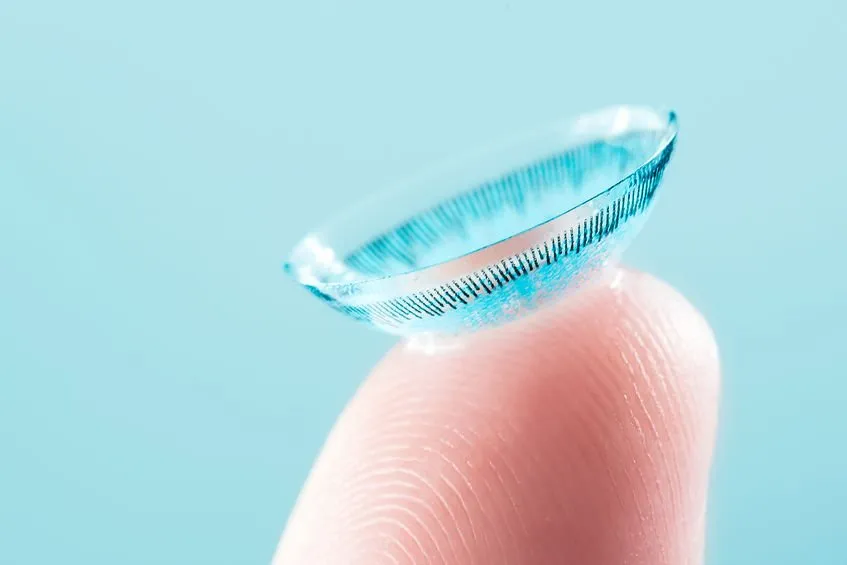Is it OK to Sleep with Colored Contacts?
Quick Answer
Sleeping with colored contact lenses is generally not advised. Doing so can increase the risk of eye infections, corneal ulcers, and other complications due to reduced oxygen transmission to the eyes during sleep. For the health and safety of your eyes, it's best to remove and properly clean your contact lenses each night before bed.
The Risks of Sleeping in Colored Contacts
Even though colored contacts can be fun and change your look dramatically, wearing them to bed carries risks that are far from worth it. Let's break down what those risks are and why they matter.
When you sleep in your contacts, your corneas get less oxygen because the lenses cover the surface of your eyes and reduce the amount of air that reaches them. During the day, blinking helps circulate tears under the lenses, but at night, this natural cleaning process slows down. This creates the perfect environment for bacteria to grow, potentially leading to eye infections like conjunctivitis or more serious conditions such as corneal ulcers.
Colored lenses have added pigments that, while safe during waking hours, can contribute to a higher risk of reduced oxygen transmission to the eye when worn overnight. This is because the colorant adds an extra layer your eye needs to breathe through.
Moreover, sleeping in any contact lenses increases the chance of the lens sticking to the eye, making it hard to remove without causing irritation or even tiny scratches on your cornea (the corneal abrasion). And let's not forget comfort; waking up with dry, gritty eyes is no fun and can lead to a cycle of irritation and potential injury.
Leaving colored contacts in while you sleep might seem convenient, but it does more harm than good, compromising the health and comfort of your eyes.

What If You've Accidentally Slept in Your Colored Contacts?
So, it happened. You fell asleep with your colored contacts in. Don't panic-here's how to handle the situation gently and safely.
- Immediate Actions: Don't rush to remove them immediately upon waking. Give your eyes a moment. Blink gently to lubricate the lens naturally with your tears. This can help minimize irritation and make removing the lenses easier and safer.
- Eye Examination: After you've successfully removed the lenses, inspect your eyes for any signs of redness, discomfort, or unusual discharge. These could be early indicators of an eye infection or irritation.
- Rinse and Rest: Even if your eyes seem fine, it's wise to rinse them with a sterile saline solution or artificial tear drops to flush away any potential irritants. Afterwards, give your eyes a break from contact lenses for the day, allowing them to recover.
- Monitor Your Symptoms: Keep an eye on how your eyes feel over the next few days. Persistent irritation, sensitivity to light, or worsening redness are all signs that you should seek advice from an eye care professional without delay.
- Consult Your Eye Care Professional: If you experience any worrying symptoms after accidentally sleeping in your colored contacts, it's crucial to consult your eye care provider. They can offer a thorough examination and suggest appropriate treatment to prevent further damage.
Accidents happen. The important thing is to respond thoughtfully and to use the incident as a reminder of the importance of proper contact lens hygiene and care practices moving forward.
How to Wear Colored Contacts Safely: Best Practices for Extended Wear
If you're captivated by the idea of transforming your eye color and want to do so responsibly, even for extended periods, here's how to wear colored contacts safely:
- Choose FDA-Approved Lenses: Firstly, make sure you opt for colored contacts that are specifically labeled as FDA-approved for extended or overnight wear. These lenses are crafted to allow more oxygen through to your cornea compared to regular colored contacts.
- Consult with Your Optometrist: Before committing to overnight colored contacts, have a detailed discussion with your eye care professional. They can determine if your eyes are suitable for extended wear lenses and guide you towards the best options for your vision and eye health.
- Follow a Strict Cleaning Regime: Even if your lenses are approved for extended wear, maintaining excellent hygiene is crucial. Follow a thorough cleaning routine as recommended by your optometrist, including using proper contact lens solution and regularly cleaning your contact lens case.
- Adhere to Wear Schedules: Respect the wearing schedule prescribed by your eye care provider. This may include how many hours a day you can wear the lenses and how often they should be replaced.
- Monitor Your Eye Health: Pay close attention to any changes in your vision or comfort, and look out for signs of eye fatigue or irritation. If you notice anything unusual, remove your lenses and consult with your optometrist immediately.

Love Your Look and Your Eyes: Remove Those Colored Lenses Before Bed!
While colored contacts might spice up your look, sleeping in them can lead to a bunch of eye troubles that you really don't want. Always remember to take those lenses out before hitting the pillow to keep your eyes happy and healthy. If you do end up catching some Z's with them on by mistake, don't stress-just take them out gently, give your eyes some love with a good rinse, and take a lens-free day. And make sure to keep regular dates with your eye doctor; it's the best way to ensure those peepers stay in top shape while you rock your favorite shades.
FAQs about Colored Contacts
- Q1: Can I close my eyes for 10 minutes with contacts?
- Yes, closing your eyes for a brief period, such as 10 minutes, with contacts in should generally be fine. However, ensure your lenses are well-hydrated and that you're not experiencing any irritation before doing so.
- Q2: Can I rub my eyes with contacts?
- Rubbing your eyes while wearing contacts is not advised. This can cause the lenses to shift, potentially leading to irritation or damage to the lens and your eye. If your eyes feel irritated, try using lubricating drops compatible with your lenses, and if the discomfort persists, remove the lenses and consult an eye care professional.
Read More
- How to put contact lenses in,Quick start for newbies!– ojotrend
- Are Hema Contact Lenses Safe,What Other Brands Are Also Safe?– ojotrend
- Contact lenses side effects,newcomers need to know!– ojotrend
- Colored Contact Lens Guide: Safe & Stylish Wear– ojotrend
- What Are the Best Colored Contacts for Black Eyes?– ojotrend









